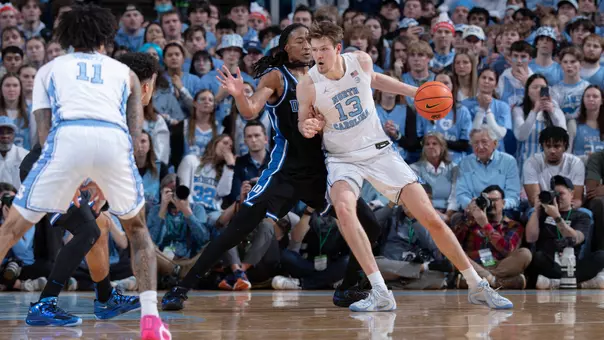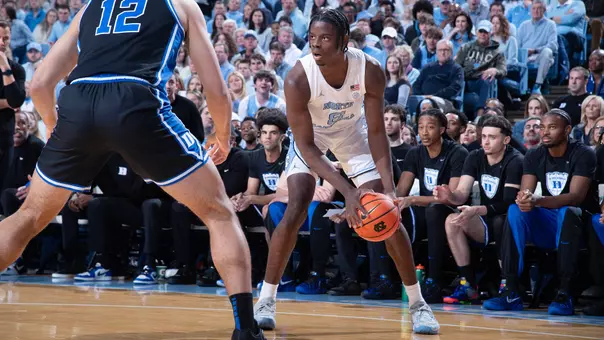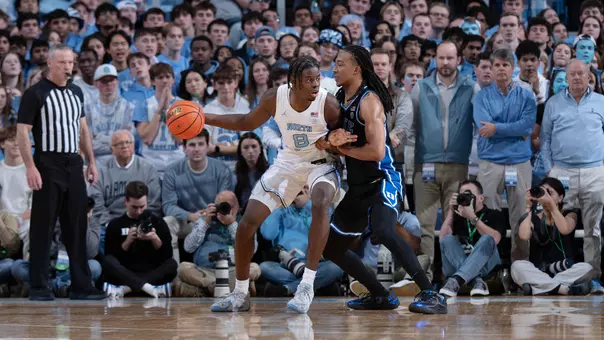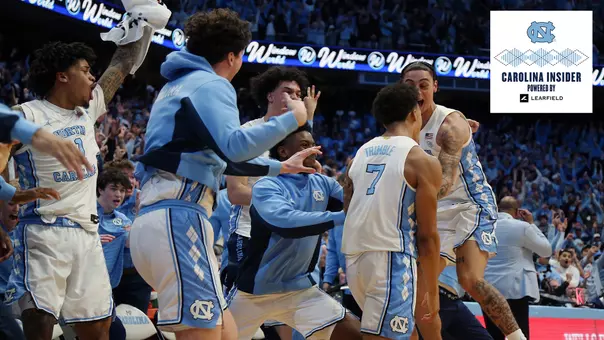University of North Carolina Athletics
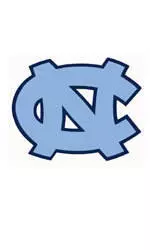
Mouth Of The South Dominated The Radio
February 28, 2008 | Men's Basketball
Feb. 28, 2008
CAROLINES
y Rick Brewer
When Bill Currie passed away recently it ended the life of one of the most flamboyant and popular broadcasters this state has ever known.
And the Mouth of The South was known by everybody. He was the man who first put together the Carolina Radio Network that has grown into perhaps the best in the nation. He did it with a style unlike any other.
He began his career in the 1950's, but young people who weren't even born at the time have heard stories about him, his humor and irreverence that tried to keep sports in proper perspective.
Currie came along at a time before games were being televised. Fans wanting immediate information on their team got it strictly from radio. In this state they got vivid descriptions of the action.
Currie got his start at WRAL in Raleigh, serving as color commentator for Ray Reeve on the Tobacco Road Radio Network. Individual schools did not have official networks so Reeve and Currie probably had bigger audiences than any broadcaster today.
Reeve's gravely voice and Currie's flowery comments dominated the radio during the college football and basketball seasons. Hundreds of thousands of people first heard about college sports from these men. The Baby Boomers, in particular, were just beginning to develop an interest in sports and turned to Reeve and Currie for up-to-date coverage.
They could get it almost any day. The Tobacco Road Network covered all the Big Four schools. Reeve and Currie might be at Virginia on Monday, in Clemson the following night, at South Carolina on Wednesday, back to Wake Forest on Thursday and in Chapel Hill on Saturday. Sometimes if two of the Triangle teams were at home on Saturday, they would do one game in the afternoon and another that night. If a Big Four team was playing, they were there.
They knew more back roads and shortcuts than a local bootlegger. In fact, that may be where Reeve got his directions. Ray's love for the bottle was well documented. He often went on the air slightly inebriated, and sometimes more than just slightly. That's where Currie really developed his broadcasting skills. He had to do most of the work without making it seem so obvious.
The first televised games were done by broadvision on WUNC-TV and the rest of the state's public broadcasting system. This was the airing of games without sound. Fans listened to radio for the details. WRAL and other stations used it when Carolina went to the 1957 Final Four. Only Reeve was sent to Kansas City. Currie was in Raleigh doing color commentary by watching the games on television.
Currie moved to WVOC in Wilson in the early 1960's. That's where he formed the Carolina Sports Network. Reeve was nudged aside as Carolina, N.C. State, Duke and Wake Forest formed their own official networks. Reeve had helped create radio interest and it was people like Currie, Bill Jackson at State, Ed Higgins at Duke and Ad Penfield at Wake who built on that.
When Currie went to WSOC in Charlotte he took the network with him. By that time he had become as well known as Reeve and one of the most popular personalities on radio with his humor and colorful, rambling style. He almost became a cult figure with his nickname "The Mouth of the South." He once had a heart attack at a football game in State's old Riddick Stadium. As he was being carried down through the stands he waved to the crowd and joked with fans.
"I got WSOC more publicity with one heart attack than our promotions department did in an entire year," he said.
But, Currie was a hard worker, too. There were few powerful stations, no sports on FM radio or satellite broadcasts at that time.
"Bill probably built Carolina a network of over 60 stations," said Woody Durham, now Carolina's radio voice. "Each night AM radio was filled with static because there were more stations than there are today. All small towns had a station, but usually it wasn't a powerful one. So he had to get stations everywhere to blanket the state with Carolina sports."
Currie was more at ease behind a microphone than a Presidential candidate. You certainly could count on him to be more specific.
He tried to give his listeners a good picture of what was happening. That included more than just the action itself. He would talk about the cheerleaders, fans, officials, arena food and everything else. If a game got out of hand he might even turn to politics, religion or current events. He might interview someone in the stands. Or he would good-naturedly berate his "incoherent" sidekick, "Rowdy" Richard Raley. No one had any idea what might be heard during one of his broadcasts.
Because Currie was so outlandish, he could get away with almost anything. His most often quoted line came from the 1969 ACC Tournament. That's when he described N.C. State's 12-10 win over Duke as "about as exciting as artificial insemination."
He enjoyed and respected the coaches, players and others with whom he worked. But, he knew sports were not the most important thing in the world and wanted his listeners to understand that.
Away from the microphone Currie could tell more off-color jokes and stories than just about anyone. He was a great after-dinner speaker and could dominate a room, regardless of the audience.
Conversely, he could quote scripture easily and even mixed some with his broadcasts. He was asked to preach by many churches. Pews would be filled on the Sunday mornings when he was in the pulpit. Bob Bradley, Clemson's longtime sports information director, nicknamed him "Reverend Currie."
As one writer put it, "He could preach you a hellfire and damnation sermon or sing a hymn with an angelic look on his face, a tremor in his voice and a drink in his hand."
Currie was the subject of two Sports Illustrated features over the years. Once the magazine ran a picture of him laying in the coffin he kept in his office. He would sometimes get in there for an afternoon nap.
Despite all the jokes and escapades Currie was serious about his job. He was named the state's sportscaster of the year eight times.
Almost every year another station offered Carolina substantially more money to handle the network. But the athletic department stayed with WSOC.
"I credit Dean Smith for that," said Currie. "We had gotten the network going and he was loyal to us."
Midway in the 1971 basketball season, KDKA-TV in Pittsburgh offered Currie the sports anchor job there on the condition he take it immediately. He did his last Carolina broadcast in February, thanking anyone who had ever given him a job and everyone at Carolina.
People in Pittsburgh didn't know what to make of him with his loud jackets and wide ties. It took a while for them to appreciate the way he mixed straight sports reports with jokes, scripture and literary references. Some never liked him, but he won over a majority of his viewers.
He still kept up with Carolina athletics with calls back here and eventually by computer.
Bill was living in Washington when he passed away and donated his body for research at the University of Washington Medical School.
I hope the people there aren't interested in his larynx. I'm sure the Mouth of the South wore that out years ago.










